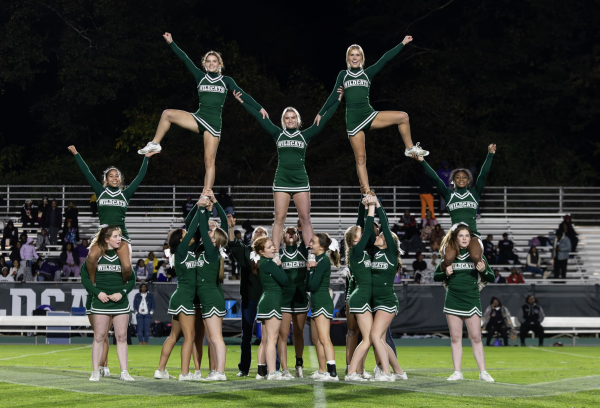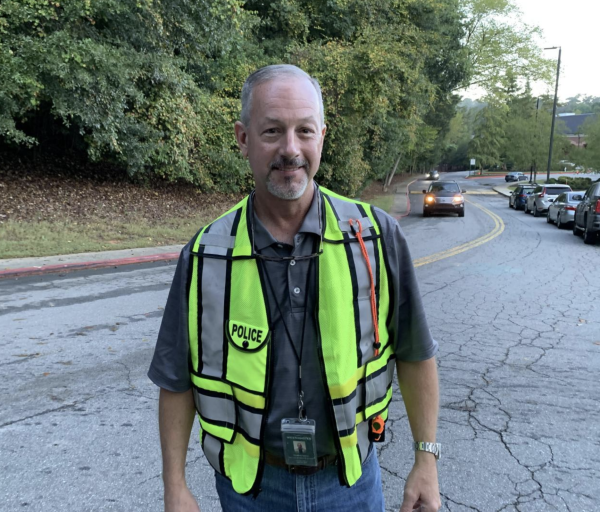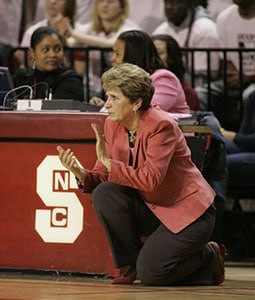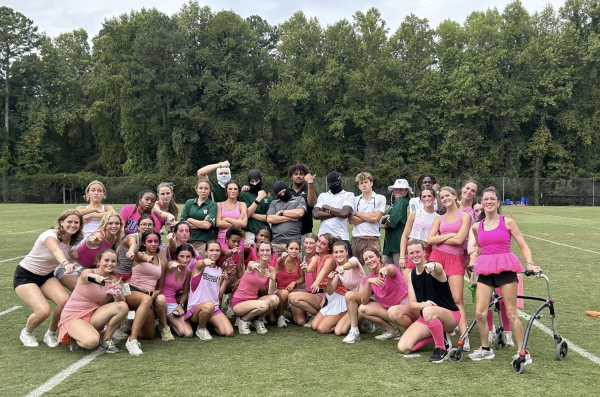Students start dialogue on mental health issues
Daily mindfulness exercises and yoga visible from the halls of Pressly. Students sharing mental health challenges in front of an 800-person student body. The production of Proof.
These events and more have coalesced this November, bringing mental health and wellness to the foreground of discussion on campus. “Emotional wellness is the cornerstone of so much of what we’re doing on campus,” said neuropsychology teacher Anna Moore.
Among these events is the relocation of the counseling office, renamed the Wellness Center or the Well, to the bottom floor of Pressly on Nov. 2.
“This seems like the perfect area for us to be visible but still have some privacy,” said director of counseling Rose Harper. “It’s nice, open, and airy, but there’s still privacy back here.”
The Well features four private counseling offices, a multipurpose room with a glass wall, a waiting room, and several study carrels lining the hallway. The space is designed to provide easy access to and promote use of student support resources.
“I didn’t even know where the counseling office was before,” said senior Benton Wood. “If everyone sees it, it’s going to be talked about, which will be really positive.”
The Wellness Center celebrated its grand opening during the week of Nov. 16 by inviting Upper School students to participate in mindfulness exercises, yoga classes, cognitive behavioral compassion training, and other wellness-related activities.
The opening week events exemplify the school’s efforts to promote mental wellness across the entire student body, not just for a select group.
“[The Well] is for everyone,” said Harper. “I’d love for counselors to be able to meet with every single student. It’s not scary to go see the counselor and have a relationship outside of just coming to the office.”
This fall, counselors met with every freshman. By fall 2018, the counseling team will know every student in the Upper School. In addition to their efforts to increase availability to a broad spectrum of students, students and faculty have integrated various wellness programs and initiatives such as Yoga Club into student life.
“I do see a turning of the tide here,” said Moore, “an opening of a topic that is taboo and heavily stigmatized.”
The increased attention to mental wellness and student-counselor interaction can be traced to the need to more effectively deal with the school’s competitive culture.
“We are in an environment where high-achieving talk is everywhere, and that exacerbates natural personality traits,” said Harper. “We attract children who like challenge, and [because of that we have to teach students to] deal with those challenges in a healthy way.”
President Keith Evans agrees with the importance of counseling and mental health-related initiatives in a high-achieving environment.
“Student support becomes more and more important in a school that also has a culture of achievement,” said Evans. “I think it has the potential of offering, even unlocking, greater potential in the student body.”
The student body has indeed begun to take action in issues surrounding mental health.
“This year,” said Moore, “we have this really interesting phenomenon happening at our school where our students have become very brave, courageous, and vocal in their willingness to talk about issues in mental health and mental wellness.”
This fall, seniors Keller Harper, Benton Wood, and Molly Wright have brought Active Minds, a nationwide nonprofit organization across high school and college campuses designed to raise awareness about mental health, to the Upper School. These students have been in contact with faculty advisors of Active Minds chapters at the University of Georgia and Emory University, and have been guided by Moore in the process of bringing the nonprofit to campus.
“The goal is to have a community of people who are aware of mental health issues,” said sophomore Caroline Matton, who is involved in Active Minds and lives with depression, anxiety, and an eating disorder, “who may live with them or just care about how they are affecting our community.”
Junior Matthew Faler, another member of Active Minds, also emphasizes that the club is open to anyone interested in raising awareness about mental health issues, not just those living with them.
“It’s for people not just with depression,” said Faler. “It’s for people who want to learn about it.”
The organization serves primarily to allow students to discuss mental health, a topic typically avoided in conversation, according to participants. Although open to anyone interested in raising awareness and destigmatizing mental health issues, Active Minds provides a safe space for students to share their experiences, promoting understanding and solidarity between those with similar stories.
“It’s become a sense of comfort that you can identify yourself,” said Keller Harper, “and that you can talk with people and not be scared or intimidated by your issues.”
Some believe that Active Minds is aimed less at group therapy than at encouraging awareness of issues surrounding mental health.
“Active Minds isn’t this crazy support group,” said Matton. “It’s for the community to get to know each other better and know what’s happening on campus.”
Others view the organization as an opportunity to streamline the healing process from mental illness.
“If people can feel comfortable sharing their story, what happens is other people say, ‘Oh, I felt that too,’ and now, we’ve normalized these issues,” said Moore. “Then we can begin to move forward and start to create some healing. Even more than that, I believe these moments might allow students to fully integrate all parts of who they are; these become the moments in life when we are perhaps most capable of fulfilling our truest potential.”
Participants and faculty alike agree that above all, Active Minds fosters conversation as a way to change the way the student body views issues surrounding mental health.
“We stigmatize [mental health issues] because we don’t understand them, but we’re getting to understand them more and more,” said Evans. “In that, you can then bring it into the light of day. For people who otherwise would have felt reluctant to ask for help, suddenly it’s okay.”
Despite the organization’s recent introduction to campus, members confirm that discussion about mental health has already increased.
“Everybody’s more comfortable with talking about mental health,” said Wood. “I predict that next year it’ll be as normal as Yoga Club.”
On Nov. 12, Active Minds leaders and participants as well as cast members of Proof, the play performed last weekend that follows a young woman’s struggles with mental illness, shared these initiatives with the student body. In addition to promoting the organization and play, leaders and cast members invited Upper School students to help raise awareness and engage in conversation about mental wellness by wearing green t-shirts on Nov. 13.
Additionally, the assembly introduced the idea of sharing personal experiences with mental health. The video clip from the play, Moore’s invitation to all students to tell their stories, and the Active Minds representatives’ introductions aimed to foster more student conversation from a personal perspective.
Among these representatives was Wood, who has dealt with severe depression in recent years. In a stable place now, he is dedicated to helping others learn from his experiences and supporting people experiencing depression.
“If anyone wants to talk anonymously or if you want to give me your name, I am here to help you,” said Wood in a Facebook post on Sept. 11. “Reach out to me if you are feeling down or suicidal.”
In addition to the Facebook post, which garnered 452 likes, Wood delivered a speech to much of the senior class and their families at the Cum Laude and National Honor Society induction on Nov. 10, in which he told his story.
“In my speech, I was afraid I would be the outcast and have no friends,” said Wood. “But my phone actually crashed because I got so many texts from people after my Facebook post. It was the polar opposite.”
Wood emphasizes the importance of sharing personal experiences with mental health as a therapeutic tool as well as a talking point for those sharing similar mental health issues, citing his decision to tell as many people as possible as the best of his life.
“I would televise my story if I could,” said Wood. “The more people that know, the better I feel. People ask me questions about what [depression] is like, and I answer. It’s just so helpful.”
Students have benefitted from learning about Wood’s experiences with depression.
“He really raised awareness for me,” said Faler. “[It turns out] there’s a lot more people struggling than you think.”
Moore is currently collecting stories like Wood’s as a part of a student support study, a multifaceted analysis on how the school supports students from social, emotional, and learning perspectives from pre-first to 12th grade. Asked by Evans to conduct the study, Moore has looked at policies, procedures, and systems of student support currently in place on campus, interviewed students and parents, and analyzed case studies.
Evans notes the importance of the fast-paced advancements of the neuroscience field when looking for ways to enhance and improve student support.
“We need to make sure we aren’t solving a problem of today with yesterday’s idea because the field is growing and changing so fast,” said Evans. “I think [Moore’s background in neuroscience] will help us create something that lasts and that really hits with where the science is headed.”
The study is still in its preliminary stages of implementing new programs on campus.
“I think this can be year by year for a while,” said Evans. “I don’t think it’s going to feel like a lightning bolt. Probably what we end up with is an overlapping bunch of safety nets for students where resources and support feel readily available, reliable, and credible.”
To go about instigating further change on campus, Moore argues that student perspectives are paramount in analyzing social, emotional, and learning support.
“The teachers, coaches, club sponsors, and adults on this campus care so much about our students, and we are looking for ways to be even stronger,” said Moore. “Student stories, illustrating both moments of success but also moments when the school might have responded differently, will help me paint the most complete picture of our school.”
Some of these students argue that the school has been accepting of the idea of mental health issues.
“If you reach out and explain what’s going on and have a team of professionals behind you, they take you really seriously,” said Matton. “It’s really dependent on how and how often you ask for help.”
Others see the school’s perspective on mental health issues as a work in progress.
“I think it would be cool to see a little more commitment to accepting kids with learning differences [that relate to mental health, such as ADHD and dyslexia],” said senior Allison Wise, “but I think we’re moving in the right direction.”
Not all these perspectives are positive. In a schoolwide poll, 50.4 percent of the 225 respondents stated that the school does not take the mental health of its students seriously.
“Because of my ADHD, my teacher told me that I would never amount to anything because I was a lazy procrastinator,” said an anonymous senior with ADHD.
Additionally, among anonymous poll responses were criticisms of the school for favoring state championships over the mental health of its students and assigning homework loads that induce anxiety rather than prevent it.
“To the students who have felt hurt, isolated, or brushed off by an institution or who have felt judged or minimized by their learning differences, anxiety, or depression,” said Moore, “I would say please don’t ever give up in terms of asking for help and trying to be a self-advocate.”
Evans also welcomes student feedback to continue the study and promote positive change on campus.
“We want you to feel 100 percent that we take [mental wellness] seriously,” said Evans. “So raise your hand, send an email, drop in, and tell us what it is. We’re going about it quite seriously and really mean it.”









